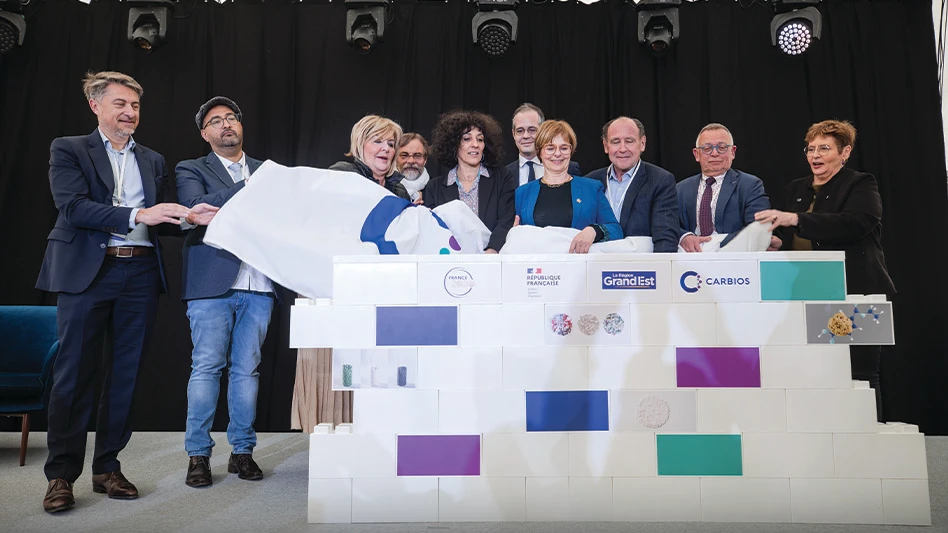
Photo courtesy of Carbios
Carbios, a France-based company that uses biological technologies to recycle plastic and textiles, recently hosted a groundbreaking ceremony for its polyethylene terephthalate (PET) biorecycling plant in Longlaville, France. The ceremony was attended by more than 200 guests, including representatives of local authorities, partner brands and industrial partners that make up Carbios’ ecosystem.
The new facility in Longlaville is Carbios’ first commercial plant, and the company says it will play a key role in the fight against plastic pollution, offering an industrial-scale solution for the enzymatic depolymerization of PET scrap in order to accelerate a circular economy for plastic and textiles. Carbios says the plant will have a processing capacity of 50,000 tons per year of prepared scrap when operating at full capacity.
Work is progressing on schedule, with the company noting significant quantities delivered will be to customers in 2026.
RELATED: Carbios receives permits for PET biorecycling plant
Carbios says the plant will create 150 direct and indirect jobs in the region. In October 2023, the company obtained the building and operating permits for the site. The factory is currently under construction on land officially acquired from Indorama Ventures on Feb. 14.
Also in February, Carbios and De Smet Engineers & Contractors announced their collaboration to manage construction. Several feedstock supply agreements, notably with Citeo and Landbell Group, will secure the majority of the raw materials required. Close to the borders of Belgium, Germany and Luxembourg, the plant’s location is strategic for access to nearby scrap supplies.
As part of the France 2030 initiative, Carbios will receive grants totaling 54 million euros ($57.9 million) from the French State and Grand-Est region where the plant will be located.
“We can help save the planet thanks to science, passionate teams, private and public funding to meet industrial and commercial stakes and loyal partners," says Philippe Pouletty, founder and chairman of Carbios’ board of directors. "This groundbreaking ceremony for the Longlaville plant marks the start of our industrial and commercial rollout to make Carbios a world leader in plastic recycling in the coming years.”
Carbios says with its recycling technology, PET no longer will be made from oil, but from its own scrap.
“This technological breakthrough opens up new recycling streams for multilayered, colored and opaque trays made from packaging waste and polyester textile waste, which until now have been little or not recycled at all, giving them value," the company says.
In a LinkedIn post published April 24, France President Emmanual Macron says, “A technological revolution is taking shape with the groundbreaking ceremony of Carbios’ plant in Longlaville: The world’s first biorecycling plant. French pride! Ecological transition and growth made in France and innovation go hand in hand.”
Christophe Bechu, minister for ecological transition and territorial cohesion, says, “At a time when governments are negotiating an international treaty against plastic pollution in Ottawa, the groundbreaking of Carbios’ biorecycling plant is particularly significant. It illustrates France’s commitment to the ecological transition and demonstrates our ability to turn challenges into opportunities for a more sustainable future. This plant, a world first, embodies French innovation in responding to complex environmental challenges, offering a sustainable solution for a future where plastic and textile waste will be transformed into valuable resources for a truly circular economy.”
Carbios says its technology enables PET circularity and provides an alternative raw material to fossil-based monomers, giving PET producers, waste management companies, public bodies and brands an effective solution to meet regulatory requirements and their own sustainability commitments.
Franck Leroy, president of Région Grand-Est, says he is proud to support the deployment of the plant. “Carbios is a perfect illustration of our vision of modern, responsible reindustrialization, placing the Grand-Est region at the heart of the ecological transition," he says. "This key innovation in the fight against plastic pollution will also create 150 jobs in the Longlaville area."
Carbios CEO Emmanuel Ladent says the company has turned a vision into reality with the groundbreaking of the facility.
“Our revolutionary enzymatic depolymerization technology marks the beginning of a new era in plastic recycling, moving away from dependence on oil to a circular economy fueled by PET waste itself,” Ladent says. “Carbios continues its mission by collaborating with strategic partners around the world and embarking on a promising commercial and international deployment. I would like to thank our partner brands and industrial partners present, particularly L’Oreal Group, L’Occitane en Provence, Puma, Suntory Beverage & Food Europe, Salomon, On, Citeo and Novonesis for their contribution to the success of this historic event.”
Latest from Recycling Today
- Aqua Metals secures $1.5M loan, reports operational strides
- AF&PA urges veto of NY bill
- Aluminum Association includes recycling among 2025 policy priorities
- AISI applauds waterways spending bill
- Lux Research questions hydrogen’s transportation role
- Sonoco selling thermoformed, flexible packaging business to Toppan for $1.8B
- ReMA offers Superfund informational reports
- Hyster-Yale commits to US production





